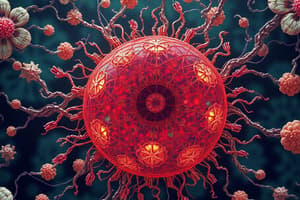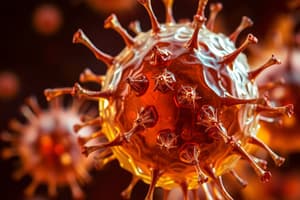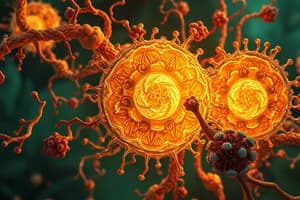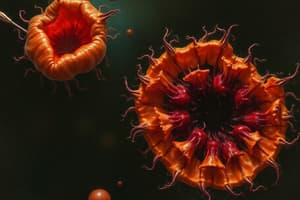Podcast
Questions and Answers
What are the primary steps involved in apoptosis?
What are the primary steps involved in apoptosis?
- Cell shrinkage, nuclear envelope formation, DNA replication, cell division
- Cell swelling, cytoplasm expansion, chromatin duplication, membrane fusion
- Cell enlargement, membrane perforation, chromatin unraveling, nuclear division
- Cell shrinkage, membrane blebbing, chromatin condensation, cytoskeleton collapse (correct)
How does apoptosis contribute to cancer prevention?
How does apoptosis contribute to cancer prevention?
- By removing cells that could potentially become cancerous (correct)
- By promoting uncontrolled cell growth
- By increasing cell division rates
- By blocking the immune response
Which statement accurately describes a characteristic of apoptosis?
Which statement accurately describes a characteristic of apoptosis?
- It allows for the clean-up of cellular debris by other cells (correct)
- It is an uncontrolled process that leads to cell death
- It promotes inflammation in surrounding tissues
- It leads to the formation of a new type of cell
What occurs to the chromatin during apoptosis?
What occurs to the chromatin during apoptosis?
What is the role of macrophages in the context of apoptosis?
What is the role of macrophages in the context of apoptosis?
Flashcards
Apoptosis
Apoptosis
Programmed cell death that occurs in a controlled manner.
Steps of apoptosis
Steps of apoptosis
The controlled sequence of events for cell death, including shrinking and membrane blebbing.
Chromatin condensation
Chromatin condensation
Process where chromatin becomes tightly coiled during apoptosis.
Macrophage
Macrophage
Signup and view all the flashcards
Blebbing
Blebbing
Signup and view all the flashcards
Study Notes
Apoptosis: Programmed Cell Death
- Apoptosis is a controlled process of cell self-destruction.
- Cells undergo specific steps leading to their demise.
- Key features include chromatin shrinkage, membrane blebbing, and cleanup by other cells.
- This process is crucial during fetal development.
- Apoptosis plays a crucial role in preventing cancer; its inhibition can contribute to cancerous growth.
Stages of Apoptosis
- Cell shrinkage: The cell reduces in size.
- Membrane blebbing: Outward bulges appear on the cell membrane.
- Chromatin condensation: Loosely coiled DNA (in G1) condenses.
- Cytoskeleton collapse: Internal protein filaments within the cell disintegrate.
- Nuclear envelope breakdown: The membrane surrounding the nucleus disintegrates.
- DNA fragmentation: DNA is broken down into nucleosomal units.
- Apoptotic body and microvesicle release: The cell releases cellular components (apoptotic bodies and microvesicles.
Role of Macrophages
- Macrophages, a type of white blood cell, consume and eliminate dead cells and cellular debris, including apoptotic bodies.
Studying That Suits You
Use AI to generate personalized quizzes and flashcards to suit your learning preferences.




